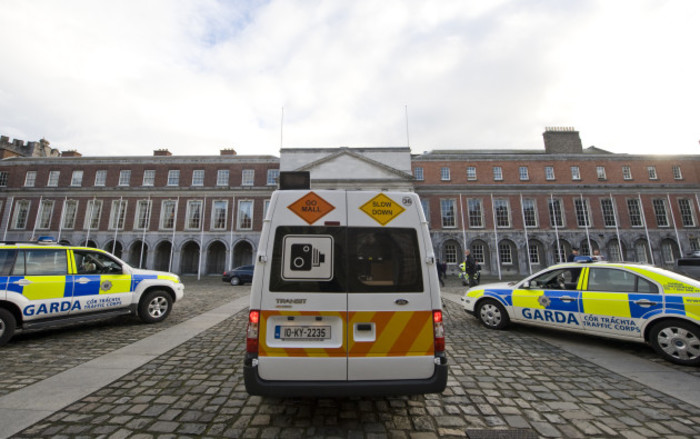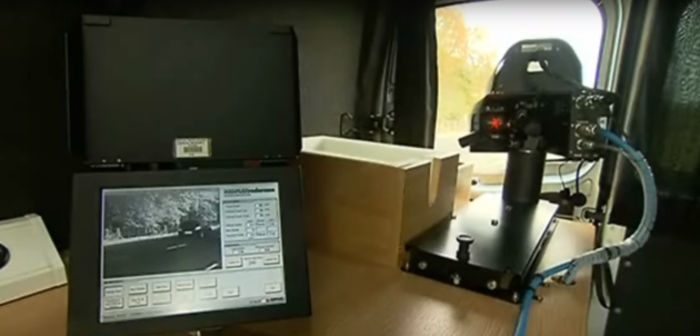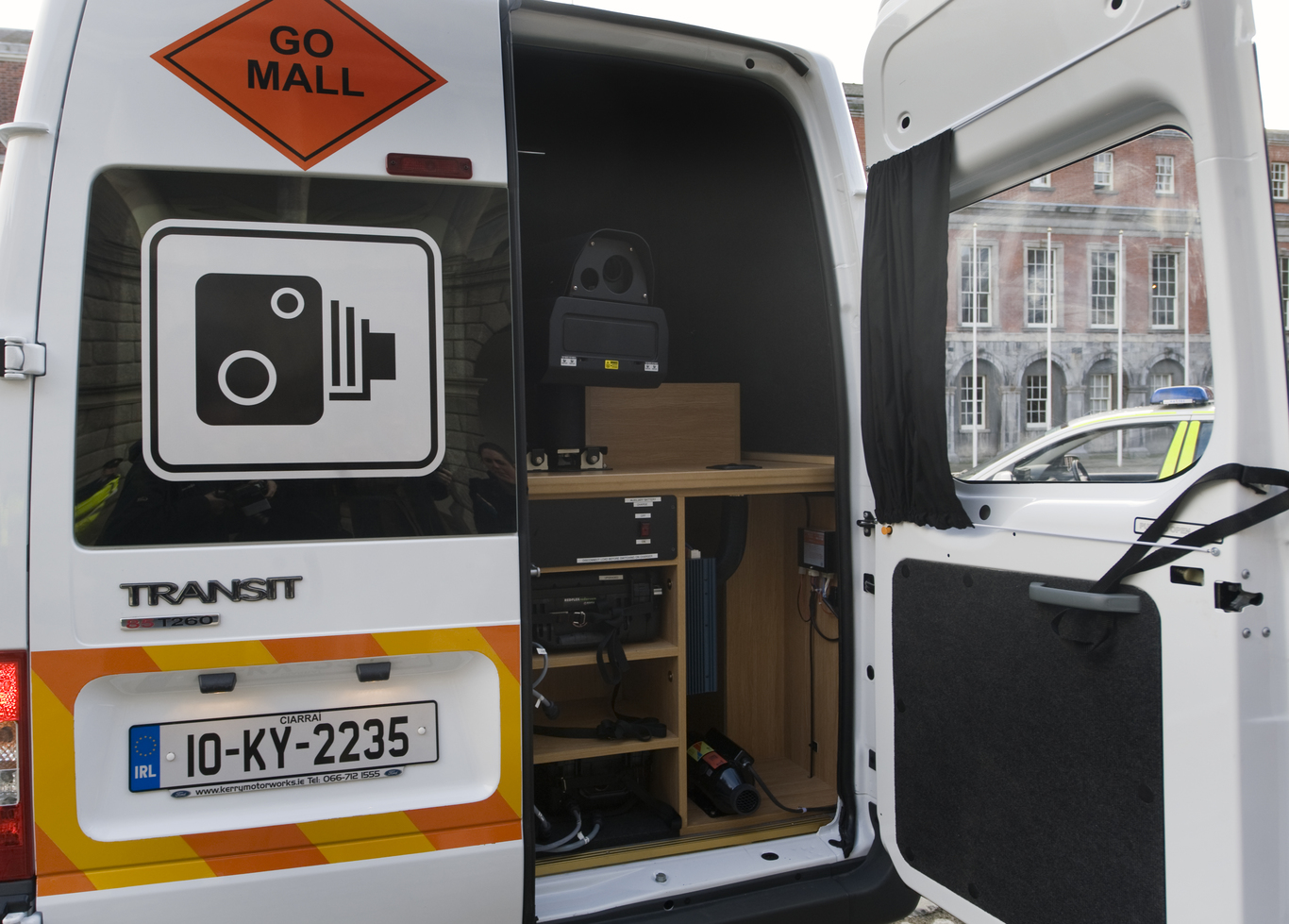Gardai renewed contract for speed vans that 'should be consigned to the dustbin'
The service has been outsourced to GoSafe despite the system being labelled ‘inherently flawed’.
AN GARDA SÍOCHÁNA renewed the contract for Ireland’s speed van network without a tender despite one judge labelling the operator’s system as “inherently flawed”.
The GoSafe consortium initially won the €80 million contract to run a network of speed vans across Ireland in 2009.
The contract expired in November last year, however it was renewed while the gardaí put the service out to tender again.
The contract, worth an average €16 million per year, was rolled over despite concerns about the GoSafe system dating back as far as 2012.
Since the initial tender was completed, the company has come under repeated criticism for being unable to enforce the speeding fines issued to drivers.
In 2014, Limerick TD Patrick O’Donovan told the Dáil that nearly 1,400 cases involving GoSafe vans have been thrown out by district courts around the country.
Some of the reasons why the cases were dismissed include:
- A judge deemed GoSafe staff do not have the authority to give evidence in court for disputed fines
- Neither gardaí nor GoSafe were able to provide evidence that a fixed-charge notice was created before being delivered to the accused
- A GoSafe official refused to inform the court the speed over the limit at which the firm start prosecuting drivers
- A judge ruled that GoSafe employees do not have the authority to carry out all their duties.

On three separate occasions in 2014, the Department of Justice requested reports into the mass dismissal of speeding fines issued by GoSafe.
A spokesman for the department confirmed to Fora that then-minister Alan Shatter did meet with Garda management over the incidents.
However he added “the question of publishing this material did not arise” when asked for copies of the reports or actions taken on their findings.
Since the contract was renewed late last year, speeding fines issued by the company have continued to be overturned in court.
Most recently in March, Judge Patrick Durcan in Ennis District Court refused to prosecute numerous detections recorded by the operators of the GoSafe vans.
He ruled that GoSafe employees required a warrant granting them the power to carry out their duties and recommended that the case go to the High Court. Those proceedings are expected to take place in the this summer.
When we contacted GoSafe about any measures it had taken to address the issues the judges identified, a company representative replied “we are precluded under the contract from making comment” and referred questions to the Garda press office.
The operator did, however, confirm it has applied for the new tender to operate the Garda safety camera network.
A spokesman for An Garda Síochána would not confirm to Fora any measures that had been taken to address claims that the evidence produced by GoSafe’s speed cameras is “inherently flawed”, as described by one judge.
One of the key issues raised in the numerous court cases has been the inability of both the gardaí and GoSafe to prove the proper delivery of fixed-charge notices to those caught speeding.
Last October, Transport Minister Paschal Donohoe said new software purchased would help prove delivery of fixed-charge notices. He added that the software costed €6.5 million and will be ready in late-2016.

Timeline
2012
March – Judge Mary Devins of Westport District Court called the GoSafe camera system “an abject failure” after criticising the quality of evidence produced by an employee of the firm in court.
2014
March – Judge Patrick Durcan dismisses three GoSafe speeding fines in Ennis District Court after one of the company’s representatives refused to tell the court at what speed over the limit the firm start prosecuting drivers.
April – Then-justice minister Alan Shatter asked the garda commissioner for a report into GoSafe after a company whistleblower told an RTÉ Prime Time investigation that motorists were being wrongly fined for speeding offences.
October – The Department of Justice called for another inquest from An Garda Síochána into GoSafe following 98 speeding cases being dismissed by Judge Patrick Durcan at Ennis District Court.
December – Judge Sean McBride dismissed 17 prosecutions in Monaghan District Court. He also said two months earlier that the GoSafe speed vans should be “consigned to the dustbin”.
2015
April – In Castlebar District Court, a GoSafe speeding case was struck out after evidence could not be provided that a fixed-charge notice was created before being delivered to the accused.
June – 10 speeding cases registered by GoSafe were dismissed in Kilmallock District Court due to defendants claiming that they had not received a fixed-charge notice.
September – While representing a client who was caught speeding, solicitor Daragh Hassett requested a copy of the contract between the gardaí and GoSafe. The court ruled in favour of Hassett’s client, however the gardaí withdrew its prosecution and ended the case so no contact was released.
October – Minister Paschal Donohoe committed to closing a loophole in the system that allowed people to dodge speeding fines issued by GoSafe by claiming they never received a fixed-charge notice. The new software to prove delivery of fixed-charge penalties will cost €6.5 million and will be ready in late-2016.
2016
March – Judge Durcan refused to prosecute speed detections made by the operators of the GoSafe vans. He also ruled that GoSafe employees require a warrant that grants them powers to carry out their duties and recommended that the case go to the High Court.





